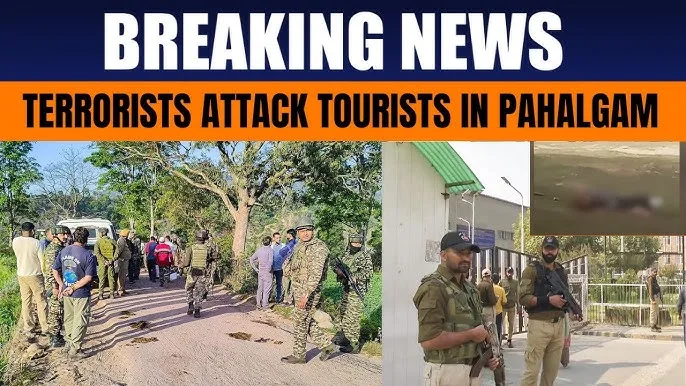Terrorist Attack in Pahalgam Kashmir India: Rising Tensions and National Response
In a tragic turn of events, a terrorist attack in Pahalgam Kashmir India has reignited national concerns about regional security and peace in the Union Territory of Jammu & Kashmir. The incident, which occurred in April 2025, has left the entire nation in mourning and has once again put a spotlight on India’s counterterrorism policies, regional geopolitics, and the vulnerability of soft targets in the valley.
🚨 Timeline of the Incident
The attack took place on the evening of April 20, 2025, in the picturesque town of Pahalgam, which is globally known for its scenic beauty and its route to the Amarnath Yatra. According to initial reports, a group of heavily armed militants ambushed a convoy of security personnel near the Lidder river belt, around 6:30 PM.
Eyewitness accounts describe a sudden burst of gunfire followed by the sound of explosions, leaving both civilians and security forces scrambling for cover. Within minutes, reinforcements were dispatched to the area. Despite their swift action, the militants had already inflicted significant damage.
📉 Casualties and Damage
As per official sources, seven personnel of the Indian Armed Forces lost their lives in the line of duty, while twelve others were injured, some of them critically. In addition, two civilians were also killed, including a local tourist guide and a shopkeeper. Properties in the nearby marketplace suffered partial damage due to the gunfire exchange.
The identities of the attackers are currently under investigation, but early intelligence suggests links with cross-border militant groups operating from the Pakistan-administered side of Kashmir.
🔍 Security Forces’ Swift Response
The Indian Army, Jammu & Kashmir Police, and CRPF units launched a coordinated search operation just hours after the attack. A strict curfew was imposed in and around Pahalgam, and additional troops were airlifted to prevent the escape of the perpetrators through the nearby forest regions.
According to army sources, at least two militants were neutralised during a follow-up encounter the next morning. Drone surveillance, sniffer dogs, and thermal imaging are being employed to comb through the rugged terrain of Anantnag district.
🏛️ Government and Political Reactions
Prime Minister Narendra Modi, Home Minister Amit Shah, and Defence Minister Rajnath Singh have strongly condemned the terrorist attack in Pahalgam Kashmir India, assuring the country that such cowardly acts will not go unanswered.
In an emergency meeting chaired in New Delhi, the Ministry of Home Affairs directed all border and valley-based security forces to remain on high alert. In a statement, the PM reiterated that the martyrs’ sacrifice would be avenged and the perpetrators would face severe consequences.
Opposition parties also expressed solidarity and urged the Centre to take “decisive action” to crush terrorism in the region once and for all.
📺 Media and Public Sentiment
News channels, digital platforms, and social media erupted with outrage, calling for strict action against militant networks and their foreign supporters. Hashtags like #PahalgamAttack and #KashmirUnderAttack trended for hours, with users expressing grief, anger, and support for the armed forces.
The incident has also sparked debate around tourist safety in Kashmir. The Union Territory had just begun recovering its image as a peaceful destination post the abrogation of Article 370. Tourism authorities fear that such attacks may severely impact the region’s summer season prospects.
🌐 Impact on Regional Stability
This terrorist attack in Pahalgam Kashmir India comes at a time when India-Pakistan relations were already strained. Diplomatic experts believe this could further deteriorate bilateral dialogues and jeopardise backchannel peace talks that had reportedly resumed recently.
Furthermore, security analysts suggest the attack might be a tactical attempt to derail the upcoming local elections in Jammu & Kashmir scheduled for later this year. The Election Commission is currently reassessing the ground situation before finalising polling dates.
🚧 What Lies Ahead
In the aftermath of the Pahalgam attack, several measures are likely to be fast-tracked:
Increased military presence in vulnerable areas
Enhanced intelligence sharing among national agencies
Modernisation of surveillance and monitoring infrastructure
Community-police partnership programs to encourage public cooperation
Heightened security during religious yatras and festivals
There’s also a renewed call for revisiting India’s counterinsurgency doctrine, especially concerning urban terrorism and hybrid militants who operate as civilians by day and extremists by night.
🔚 Conclusion
The terrorist attack in Pahalgam Kashmir India is a grim reminder of the complex security dynamics that continue to affect the region. While India’s military and police forces are trained and equipped to handle such threats, the nation must continue to strengthen its multi-dimensional approach—combining security, diplomacy, and development.
As investigations unfold, what remains certain is that India stands united in grief but resolute in spirit. The fallen heroes will be remembered, and justice will be delivered.
